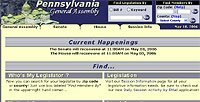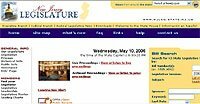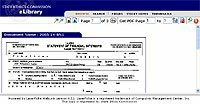Wednesday, May 10, 2006
Would it be too much trouble
 Unless you've been living under a rock since 1990, you know we now live in a digital age.
Unless you've been living under a rock since 1990, you know we now live in a digital age.More and more people are getting their news from the Internet, not just reading newspapers online, but doing legitimate research by going to many of the same sources and government Web sites as reporters.
Our government and newspapers should be encouraging that. It's a boon to Democracy and a chance for our leaders to speak directly to an informed constituency without the filter of a reporter and editors.
But they aren't.
Instead, the Pennsylvania's Legislature's Web site seems mired in the late 1990s by comparison to the New Jersey Assembly's more modern and easier to use site.
And newspapers freely cite facts from state reports they glean online, but don't enable readers to look up the information for themselves.
Meanwhile, with just two clicks, New Jersey citizens can see a list of the latest bills being introduced into that state's Assembly, a brief synopsis of the bill and a link to its full text.
And with just a few more intuitive clicks, New Jersey's Web site also lets users sort the bills by their author. What a great tool for lighting a fire under the back benchers who are only in the Capitol to collect a salary, a per-diem and a free car!
Pennsylvania's Web site doesn't offer either function.
Instead, it relies on its users knowing either a bill's number or the original topic of the bill. Sometimes even that doesn't help.
It didn't in 2004, when the state's top lawmakers slipped the 146-page bill to legalize slot machines into an unrelated two-paragraph measure about background checks for harness racing track employees, then brought the bill to the floor for a vote without any public debate before the July 4 adjournment.
To this day, anyone interested in finding the slots bill (S.B. 292 of 2004) cannot find it directly under the keyword "SLOTS." Instead, a message there refers you to either "GAMBLING AND GAMBLERS" or "HORSE RACING." The slots bill is buried deep in both topics amid a long alphabetical list of other unrelated bills.
Neither state's Web site is set up to be spidered by Google or Yahoo. Would it be too much trouble to give your constituents the ability to find information by using the leading search engines?
 Both New Jersey's and Pennsylvania's Web sites do let users subscribe to an e-mail service that tracks changes and updates to specific bills and delivers them to those interested - after the fact.
Both New Jersey's and Pennsylvania's Web sites do let users subscribe to an e-mail service that tracks changes and updates to specific bills and delivers them to those interested - after the fact.Would it be too much trouble to set up a live XML or RSS feed of all the bills that's updated as they're being worked on in committee, caucus and on the floor so that there's still time for voters to give input to their elected leaders?
The Pennsylvania site's only true innovation is a nightly e-mail subscription that lets voters receive a daily roundup of what bills were passed, voted down or introduced. But even that has its problems.
For instance, instead of one e-mail I actually get two identical e-mails - even when the Legislature isn't in session. I've tried unsubscribing and re-doing it. Same problem.
The e-mail itself is pretty vague. All it gives you is a lengthy list of bill numbers, what action was done to each, a link to each bill's history and another link that takes you to a page from where you can click another link to find its full text.
Would it be too much trouble to include the synopsis contained at the top of each bill in the e-mail so recipients would not have to click on every one of them and then onto another page to figure out what each bill is about?
Newspaper reporters and editors aren't helping the cause. They are doing their readers a giant disservice by failing to recognize this tectonic shift in how people now get their news and information.
Would it be too much trouble to actually include Web addresses (even lengthy ones) into news stories - and in the case of online newspapers, direct hyperlinks - when a reporter writes about a specific bill or a politician's campaign finance report? That way, readers could go directly there to read more and not have to play detective.
Case in point, the Harrisburg Patriot-News published a great article today, "Big Spenders," about the large advantage in campaign contributions several legislative leaders have over their primary opponents - despite the outrage over last year's now-repealed pay raise.
"Senate President Pro Tempore Robert Jubelirer, R-Blair, has raised nearly $7 for every dollar thrown into the war chest of his most serious primary opponent, Blair County Commissioner John Eichelberger. Jubelirer has raised $1.3 million to Eichelberger's $191,720. Reports for Jubelirer's other primary challenger, C. Arnold McClure, were not available yesterday."
Would it have been too much trouble to hyperlink those dollar amounts to the reports the state Department of State posts online so readers could see who gave that money? Or at the very least, give people the Web address for the online campaign finance database so they could look it up for themselves?
One final note. After spending an entire weekend reviewing the latest statement of financial interests for some of the same lawmakers the Patriot-News looked at, I have a suggestion for the state Ethics Commission.
 Would it be too much trouble to make sure the pdf files they create with these important public disclosures are not just images inside a pdf, but an actual document. That way, it could be searched and information could be copied from it. No one can do that now.
Would it be too much trouble to make sure the pdf files they create with these important public disclosures are not just images inside a pdf, but an actual document. That way, it could be searched and information could be copied from it. No one can do that now.As for the Ethics Commission's Web site, its failures are so large they account for four of my "Top 10 ways to fix Pa. today."
As news holes in newspapers continue to shrink to save money, both the Pennsylvania Legislature and the New Jersey Assembly offer e-mail subscription services to keep constituents up to date on bills. The e-mails arrive at night after it's too late for public input, but at least it's something.
 |
| 
This Week's Rants | The Daily Rant Archives

This work is licensed under a Creative Commons Attribution 2.5 License.

This work is licensed under a Creative Commons Attribution 2.5 License.


